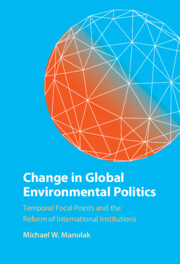 Change in Global Environmental Politics
Change in Global Environmental Politics Book contents
- Change in Global Environmental Politics
- Change in Global Environmental Politics
- Copyright page
- Dedication
- Contents
- Figures and Tables
- Acknowledgments
- Abbreviations
- 1 Introduction
- 2 It’s About Time
- 3 The Stockholm Conference and Institutional Change
- 4 UNEP and the 1982 Nairobi Conference
- 5 The Brundtland Commission and the Seeds of Change
- 6 The Rio Conference and Institutional Change
- 7 Post-UNCED UN Environmental Institutions
- 8 Conclusion
- Bibliography
- Index
2 - It’s About Time
Explaining Change in United Nations Environmental Institutions
Published online by Cambridge University Press: 12 May 2022
- Change in Global Environmental Politics
- Change in Global Environmental Politics
- Copyright page
- Dedication
- Contents
- Figures and Tables
- Acknowledgments
- Abbreviations
- 1 Introduction
- 2 It’s About Time
- 3 The Stockholm Conference and Institutional Change
- 4 UNEP and the 1982 Nairobi Conference
- 5 The Brundtland Commission and the Seeds of Change
- 6 The Rio Conference and Institutional Change
- 7 Post-UNCED UN Environmental Institutions
- 8 Conclusion
- Bibliography
- Index
Summary
This chapter introduces the concept of Temporal Focal Points in explaining change in international institutions. In doing so, it elaborates theoretically the arguments contained in the introductory chapter. It models the coordination challenge facing states as a stag hunt game, where international actors can all benefit if they are able to cooperate. In hunting stag – or, engaging in institutional change efforts – actors can move to a Pareto-superior, payoff-dominant equilibrium. The challenge that they face is that if they hunt stag and others do not, they will expend scarce assets and end up significantly worse off. The risk of acting cooperatively when others do not leads actors to persist at inferior, risk-dominant equilibria. This can change suddenly, however, when actors reach a temporal convergence of expectations. The convergence is often facilitated by the arrival of Temporal Focal Points. The heightened probability of successful coordination leads to sharp increases in political and analytical investments. The chapter concludes with a discussion of methodology and case selection.
Keywords
- Type
- Chapter
- Information
- Change in Global Environmental PoliticsTemporal Focal Points and the Reform of International Institutions, pp. 34 - 67Publisher: Cambridge University PressPrint publication year: 2022
